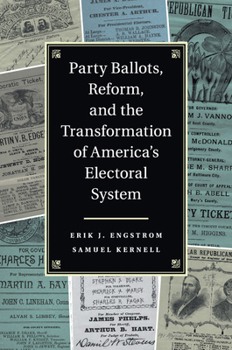Party Ballots, Reform, and the Transformation of America's Electoral System
Select Format
Select Condition 
Book Overview
This book explores the fascinating and puzzling world of nineteenth- and early twentieth-century American elections. It examines the strategic behavior of nineteenth-century party politicians and shows how their search for electoral victory led them to invent a number of remarkable campaign practices. Why were parties dedicated to massive voter mobilization? Why did presidential nominees wage front-porch campaigns? Why did officeholders across the country tie their electoral fortunes to the popularity of presidential candidates at the top of the ticket? Erik J. Engstrom and Samuel Kernell demonstrate that the defining features of nineteenth-century electoral politics were the product of institutions in the states that prescribed how votes were cast and how those votes were converted into political offices. Relying on a century's worth of original data, this book uncovers the forces propelling the nineteenth-century electoral system, its transformation at the end of the nineteenth century, and the implications of that transformation for modern American politics.
Format:Paperback
Language:English
ISBN:1107686784
ISBN13:9781107686786
Release Date:September 2016
Publisher:Cambridge University Press
Length:246 Pages
Weight:0.81 lbs.
Dimensions:0.6" x 6.0" x 9.0"
Customer Reviews
0 rating





